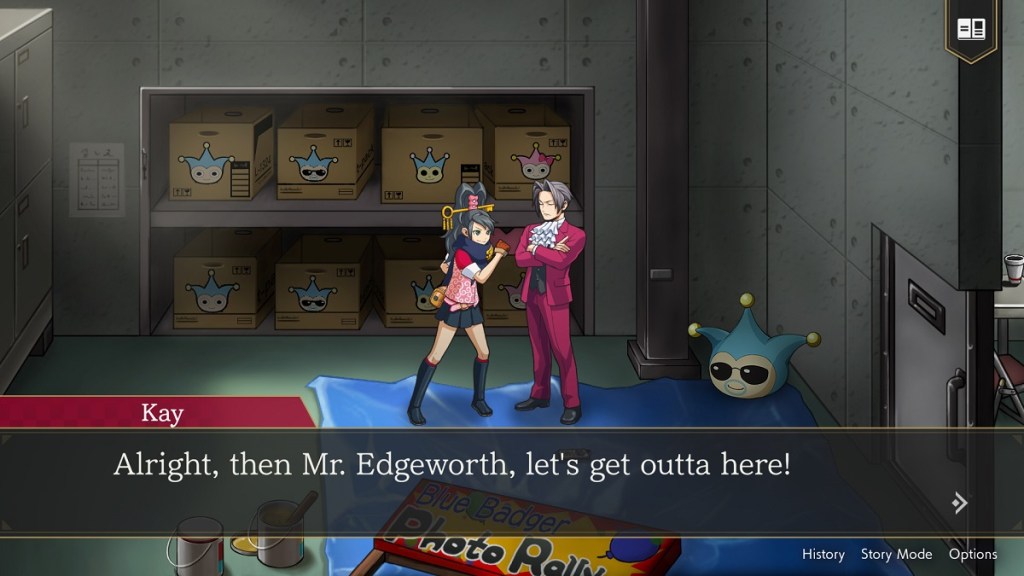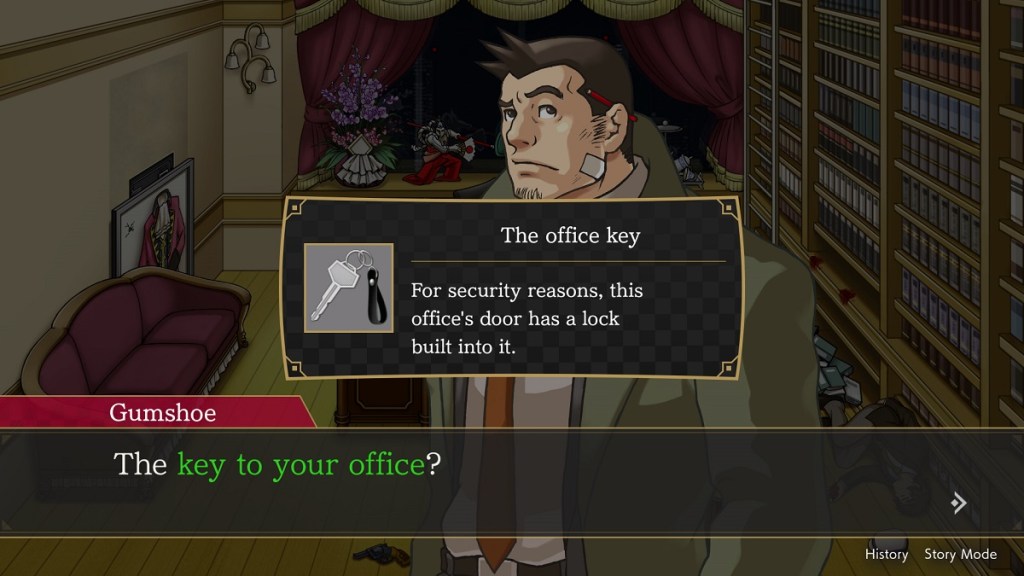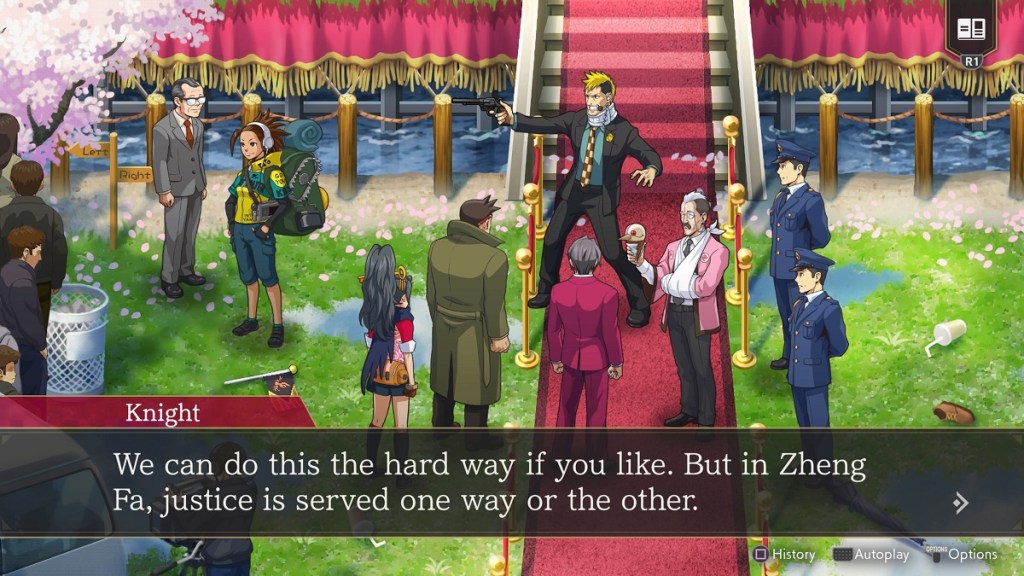In some ways, this review feels like it’s been in the making for well over a decade. Sure, Capcom only unveiled the Ace Attorney Investigations Collection a few months back, but for some longtime fans of the franchise, the journey dates back well past that. While the first Ace Attorney Investigations game was released outside of Japan in early 2010, its sequel never received a proper English localization, with Capcom citing poor sales forecasts as the primary reason.
For many, this was the end of the road, but a dedicated team of Ace Attorney fans took it upon themselves to translate and localize the game on their own, and I’m proud to say that I was able to contribute to this project all those years ago. After years (yes, plural) of work, the fan translation patch was unleashed into the wild. Still, even then, some of us (myself included) always hoped that the spin-off sequel would one day receive an official localization.
Well, that day is finally upon us. Not unlike the Apollo Justice trilogy that launched earlier this year, Ace Attorney Investigations Collection focuses on the exploits of someone other than the OG lawyer himself; namely, prosecutor Miles Edgeworth. Rather than focusing on the courtroom antics that fans have come to know and love, both Ace Attorney Investigations titles shift focus, following Edgeworth, detective Dick Gumshoe, and ‘legendary thief’ Kay Faraday as they investigate crimes well ahead of the “arrest and trial” phase.

While the core gameplay will feel quite familiar to anyone who’s played one of the mainline Ace Attorney games, the Investigations Collection shakes things up enough to feel fresh while addressing some longstanding issues that have plagued the series since day one.
For starters, rather than being limited to a fixed “first-person” camera, Ace Attorney Investigations plays more like a sidescroller with visual novel segments. In practice, this translates to having much more freedom to move around and investigate crime scenes, with characters given the full sprite treatment and a suite of animations to match. On paper, this might seem like the most insignificant of changes, but being able to walk around rather than fast-travel to a different location lends a sense of scale and cohesiveness to an investigation that other games in the franchise lack. Rather than pixel-hunting for clues on a static screen, Edgeworth and co. have more freedom to move around, interrogating witnesses and collecting clues as they see fit. This also lends itself well to storytelling, as the developers are free to let some scenes unfold with fully animated character sprites, rather than being beholden to the limitations of a visual novel.
In a similar vein, the series’ trademark loop of interrogating witnesses, pressing them for information, and presenting evidence feels right at home in both Ace Attorney Investigations games, but a few tweaks help to smooth out some of the bumps along the way. One of the main complaints that has been levied against the series since its inception is the occasional leaps in logic that cases expect you to both navigate around and accept at face value. To a degree, this issue is endemic to just about every Ace Attorney game, but the Investigations spinoffs address this through the Logic system.

As a case unfolds, Miles will keep track of unanswered questions and contradictions as “thoughts”, and by connecting these thoughts, new insights or revelations can be surmised about the crime being investigated. In the past, players (more or less) were at the mercy of each case’s story and progression to unearth key pieces of information, and while that’s still true to a degree, the Investigations games give Edgeworth more agency to piece together the clues, as opposed to someone simply doing the work for him.
In addition to the Logic system, Ace Attorney Investigations 2: Prosecutor’s Gambit also throws Mind Chess into the mix. This new minigame of sorts draws parallels to Phoenix Wright’s magatama and Apollo Justice’s bracelet, but instead of relying on supernatural trinkets to break through a witness’ lies, Miles takes a more tactful route. When engaging in a round of Mind Chess, you’ll interrogate a character who’s reluctant (or unwilling) to testify. By building up an advantage by listening to them when their defenses are raised, and going on the offensive once they’ve let something slip, you’ll gain the advantage, and have the opportunity to break through the wall they’ve put up. It’s another tool in Miles’ belt that works surprisingly well, though it admittedly took me a few tries to begin to understand the nuances. While it is by no means on the level of L.A. Noire, there is an element of analyzing your opponent’s face and body language to figure out the best course of action.
While Miles Edgeworth is no stranger to those who have played through Phoenix Wright’s trilogy of games, his character arc taking him from ruthless prosecutor to an impassioned seeker of truth and justice was always experienced from Phoenix’s viewpoint. The Ace Attorney Investigations Collection rectifies this, and getting to play as Miles himself is a real treat. Sure, he’s always been a fan-favorite, but being able to see (or rather, read) his inner monologues paints him in a new light.


The image of a stoic, and at times, ruthless prosecutor never really fades (this is a good thing, mind you), but we also get a new look at his insecurities, fears, and relationships with those around him. It’s fair to say that Detective Gumshoe is still treated like a bit of a village idiot, but beneath all of the jabs, insults, and threats of salary reductions that Miles hurls towards him, there’s an endearing and, dare I say it, wholesome friendship between the two that I can’t get enough of. Kay Faraday also brings the right amount of levity and goofiness to balance out Miles’ seriousness, and the chumminess between Kay and Gumshoe is equally infectious.
Of course, these sentiments apply to the original Nintendo DS versions of both games, but the Ace Attorney Investigations Collection gives the pair a much-welcome makeover. While I thoroughly enjoy getting to relive these games on the big screen, I was, admittedly, a bit skeptical of the “HD chibi” look Capcom went for when sprucing up the original character sprites. I’m happy to report that my skepticism was unwarranted — the high-res, high-framerate sprites and animations are nothing short of superb. Not only do they lend more charm to the colorful cast of characters, but they also do a lot of the heavy lifting during cutscenes; in retrospect, a lot of the nuances were probably lost in translation on the Nintendo DS’ tiny, low-res screens. Unfortunately, you aren’t given the option to toggle between the HD and original graphics at will, and having to quit out to the main menu to switch visual styles makes it a bit of a chore to compare the old with the new.
While the original trilogy of Ace Attorney games (as well as Apollo Justice’s debut) suffered from a zoomed-in and cropped presentation when remastered for modern consoles, Ace Attorney Investigations Collection seems to have avoided this problem, which can probably be attributed to the fact that the sidescrolling sections of the game can easily be adapted for a wider field of view. Some minor issues do rear their ugly head — I noticed a few typos that seem to have carried over from the original version of the first Ace Attorney Investigations, and it took a few hours of play before I settled on audio settings that properly balance the games’ music and sound effects — but they are hardly dealbreakers in the grand scheme of things.

Story-wise, the original Ace Attorney Investigations is an enjoyable affair, though it does stumble in its pacing and structure. The series has always experimented with telling an overarching story in each game, and Miles Edgeworth’s first solo outing attempts to do this by focusing on a smuggling ring across its five cases. While it does wrap up with a satisfying conclusion, the pacing does suffer from whiplash, seeing as how each case takes place out of chronological order. In practice, this makes it a bit more difficult to get invested in the ongoing investigation into the smuggling ring, though the game begins to find its footing in the final two cases, with the first three focusing more on introducing players to new mechanics and characters.
That being said, Ace Attorney Investigations 2: Prosecutor’s Gambit blows its predecessor out of the water. Not only does it tell a more cohesive story (without getting into spoilers, it focuses on an inquisition into Edgeworth’s prosecutorial record), but it manages to do so while also tying back into and building upon key events and characters, such as Edgeworth’s father, and the case that led up to his untimely and tragic death. Prosecutor’s Gambit is considered by many to be one of the best entries in the franchise, and such claims are well-earned.
Ace Attorney Investigations Collection (PS4) Review: Final Verdict
Much like the Phoenix Wright, Great Ace Attorney, and Apollo Justice anthologies that came before it, Ace Attorney Investigations Collection is unlikely to convert those who have dismissed the franchise (and the adventure genre as a whole) for its more laid-back, slower-paced gameplay. And at the end of the day, it’s a real shame, since Ace Attorney Investigations Collection offers up some of the best storytelling and characters the medium has seen. As a diehard fan, I can only hope that Capcom’s commitment to re-releasing every game in the franchise is another step toward a proper, seventh mainline entry. While I’m at it, would it be too much to ask for a port of Professor Layton vs. Phoenix Wright? If so, sue me.
-
Newly-added Logic and Mind Chess mechanics keep the gameplay feeling fresh
-
Some of the best stories and characters the Ace Attorney franchise has to offer
-
High-definition sprites and soundtrack rearrangements look and sound great
-
The first Ace Attorney Investigations game occasionally stumbles when it comes to its pacing
-
No option to switch between new and old graphics on-the-fly
Disclosure: Review copy was provided by Capcom.








